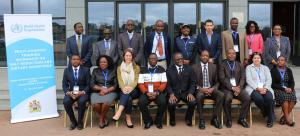Malawi hosts the first ‘Salt reduction intercountry workshop in the African Region’
Lilongwe, Malawi: From the 17 to 21 July the Ministry of Health in collaboration with the World Health Organization country office in Malawi hosted participants from 9 countries in Africa at a workshop on salt reduction and dietary interventions to prevent and control cardiovascular diseases and hypertension in particular. The nine countries represented were South Africa, Lesotho, Zambia, Zimbabwe, Botwana, Swaziland, Namibia, Malawi and the Seychelles. The distinguished guests during the opening ceremony were Dr Charles Mwansambo who is the Chief of Health Services, Dr Leslie Mgalula, the Acting WHO Representative for Malawi and Dr Jones Masiye, the Head of the Non-communicable Diseases Unit in the Ministry of Health.
Speaking to the participants during the opening ceremony, the Acting WHO Representative, Dr Leslie Mgalula highlighted that the World Health Organization developed a simple and cost-effective technical package for salt reduction The package is acronymed SHAKE, which stands for a) Surveillance to measure and monitor salt use b) Harnessing industry for reformulation of foods and meals to contain less salt , c) Adopting international standards of labelling and marketing of foods, d) Knowledge improvement through education and communication and e) Environment supportive of healthy eating.. “This is the first of a series of training workshops in the African Region and we are delighted that Malawi is the first country to host this training. On behalf of The Regional Director, Dr Moeti, I thank the Malawi Government for graciously allowing this international meeting to be held here. This cannot be taken for granted.” Dr Mgalula said.
According to the World Health Organization global information, more people die from cardiovascular diseases than from any other cause. An estimated 17.5 million people died from cardiovascular diseases in 2012, representing 31% of all global deaths. Of cardiovascular disease deaths, 80% are due to heart attacks and strokes. In the same year, an estimated 7.4 million people died from coronary heart disease and 6.7 million died from stroke. Over three quarters of cardiovascular disease deaths occur in low and middle-income countries. Deaths from cardio vascular diseases make up 37% of all premature non communicable disease deaths. The Africa region has the highest prevalence of raised blood pressure compared to other regions of WHO. Whilst this could be attributed to lack of access to medicines and services, it also represents the real need in the continent.
The Chief of Health Services in the Ministry of Health Dr Charles Mwansambo informed the participants that estimates show that, in Malawi non-communicable diseases account for at least 12% of Total Disability Adjusted Life Years and are thought to be the second leading cause of deaths in adults after HIV/AIDS. “It was evident from a 2009 WHO stepwise population survey that non-communicable diseases had become a public health problem and needed to be addressed” Dr Mwansambo said. “WHO has also supported the second non-communicable disease stepwise survey in the 2017 and we are waiting for the results to show us the current trend” the Chief of Health Services stated.
Dr Mwansambo went on to inform the participants that in response to the first non-communicable diseases stepwise survey results, Malawi established a coordinating unit for non-communicable diseases and mental health in 2011. The Ministry of Health has a Malawi Health Sector Strategic Plan running from 2017 to 2022 and it includes non-communicable disease management in its essential health care package.
According to the lead facilitator of the workshop Dr Jean-Marie Dangou, WHO is a partner to the ‘Resolve to Save Lives’ project, which, aims to save 100 million lives by implementing solutions in several countries to prevent heart disease and stroke, with three main components of management of hypertension, salt reduction and trans-fat elimination. The aim is to increase knowledge of the SHAKE package for salt reduction to support interventions in low and middle income countries.
The George Institute for Global Health in Australia is designated as a World Health Organization Collaboration Centre on Population Salt Reduction in 2013. It has a remit to support countries to develop, implement and evaluation strategies to reduce salt including increasing and disseminating evidence on effectiveness of different implementation strategies.



